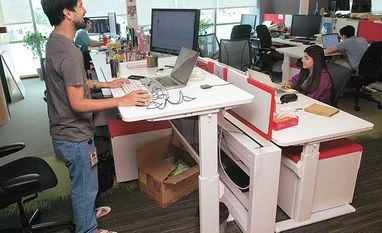The Indian infotech services industry is not unduly worried about a bill introduced earlier this week by US Senators Chuck Grassley and Dick Durbin seeking to reform the country’s popular H-1B visa programme.
H-1B visas are sought not just by offshore information technology services companies like TCS, Infosys, Wipro and Cognizant, but also by American technology companies like Microsoft, Facebook and Google.
The rhetoric over visas in the US becomes loud in the run-up to presidential elections. This time, however, the Indian infotech services industry does not seem to be perturbed although it is watching the developments.
“This debate comes up around the presidential elections and then dies down. It came up in 2008, then in 2012, and in now in 2015,” said an executive with one of India’s infotech outsourcing services companies.
“The fact of the matter is there is shortage of skills. And it is not that Indian companies are talking about this alone. Microsoft, Google, Apple and many others are saying there is a shortage of technology talent for which we need to have the H1B programme,” he added.
The US lawmakers are seeking to modify wage requirements with an aim to check abuse of the system. The bill has provisions to prohibit companies from hiring H-1B employees if they employ more than 50 people and more than 50 per cent of their employees are H-1B and L-1 visa holders.
| THE AMERICAN DREAM |
Provisions in the new bipartisan Bill
|
The bill also proposes to remove the provision where experience and education was considered an equivalent of a bachelor’s degree required for the H-1B visa. The bill proposes priority for American-educated advanced degree holders.
More From This Section
“There are certain provisions in the bill, many of them similar to earlier versions of business immigration bills, which could prove harmful to employers, not necessarily only Indian employers,” said Poorvi Chothani, an immigration expert and Managing Partner of LawQuest. “But the chances of this getting passed seem very low as immigration is a highly emotional subject in the United States and there are many people who think that there has to be a complete overhaul of the immigration system - one that address the 11 million plus undocumented immigrants in the country as well."
“This is all posturing,” said Vivek Wadhwa, technology entrepreneur and fellow at the Rock Center for Corporate Governance. “Thanks to Donald Trump, immigrant-bashing has become a national pastime for the Republicans. There is no chance any immigration bill will pass before the next president is elected,” he added.
Industry body Nasscom, which has been vocal about regressive provisions with regard to US visas, said it would lobby against the bill.
“The new bill is not as detailed as the comprehensive immigration bill. They have approached the H-1B issue piecemeal, whereas the previous bill was broader and looked at the immigration issue. We know that a part of this is election rhetoric, but it is unfortunate that it keeps coming back,” said Sangeeta Gupta, senior vice-president, Nasscom.
Any bill that is cleared by the Senate or the House of Representatives needs to be passed by the other legislative body with identical terms. The US president is required to sign a bill as jointly proposed by both the Senate and the House of Representatives for it to become a law.
“Many provisions in the bill are based on the concern of US legislators that outsourcing companies are purposefully hiring foreign workers on H1B or L-1 status and paying them lower wages. They want to encourage the Indian companies to hire more US workers,” said Sheela Murthy, president and CEO of US-based immigration law firm, Murthy Law Firm.
Industry estimates top offshore infotech services companies, including TCS, Infosys, Cognizant and Wipro, are granted 15,000-20,000 H-1B visas every year. These companies are trying to reduce their dependence on US visas by stepping up local hiring.
)